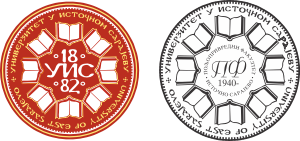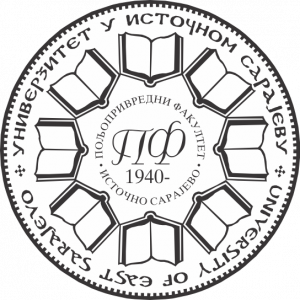I study year
| No. | Course title | Winter | ECTS | Summer | ECTS |
| 1. | Chemistry | 2+2 | 6 | ||
| 2. | Mathematics | 2+2 | 6 | ||
| 3. | Rural development | 2+2 | 5 | ||
| 4. | Botany with tree anatomy | 4+3 | 8 | ||
| 5. | Ecoclimatology | 2+1 | 5 | ||
| 6. | Plant physiology | 2+2 | 6 | ||
| 7. | Dendrology | 3+3 | 7 | ||
| 8. | Informatics | 2+2 | 5 | ||
| 9 | Geodesy | 2+2 | 6 | ||
| 10. | Wild herbs | 2+2 | 6 | ||
| The total number of classes and ECTS | 12+10 | 30 | 11+10 | 30 | |
II study year
| No. | Course title | Winter | ECTS | Summer | ECTS | ||
| 11. | Phytocenology in forestry | 2+2 | 6 | ||||
| 12. | Forest pedology | 3+3 | 7 | ||||
| 13. | Genetics with plant breeding | 3+3 | 7 | ||||
| 14. | Forest communications | 2+2 | 6 | ||||
| 15. |
Electives |
Microbiology | 2+1 | 4 | |||
| Plant nutrition | |||||||
| 16. | Forest products | 2+1 | 4 | ||||
| 17. | Mechanization in forestry | 3+2 | 6 | ||||
| 18. | Hunting with protection of hunting fauna | 4+3 | 7 | ||||
| 19 | Dendrometry | 3+3 | 6 | ||||
| 20.
|
Electives | Identification and use of fungi | 2+1 | 4 | |||
| Protected forest areas | |||||||
| 21. | Fieldwork 2 | 10 days | 3 | ||||
| The total number of classes and ECTS | 12+11 | 30 | 14+10 | 30 | |||
III study year
| No. | Course title | Winter | ECTS | Summer | ECTS | ||
| 22. | Seed production, nursery and afforestation | 3+2 | 7 | ||||
| 23. | Forest exploitation | 4+3 | 8 | ||||
| 24. | Forest cultivation | 4+3 | 8 | ||||
| 25. | Forestry biometrics | 2+1 | 4 | ||||
| 26. | Electives | GIS in forestry | 2+1 | 4 | |||
| 27. | Pathology of forest trees | 2+2 | 6 | ||||
| 28. | Forest entomology |
2+2 |
6 | ||||
| 29. | Management of torrents | 2+1 | 6 | ||||
| 30. | Establishment of forests and plantations |
2+1 |
4 | ||||
| 31. | Electives
|
Marketing | 2+1 | 4 | |||
| Primary wood processing | |||||||
| 32. | Fieldwork 3 | 10 days | 3 | ||||
| The total number of classes and ECTS | 15+11 | 31 | 10+6 | 29 | |||
IV study year
| No. | Course title | Winter | ECTS | Summer | ECTS |
| 33. | Forest growth and yield | 3+3 | 8 | ||
| 34. | Forest management planning | 3+3 | 8 | ||
| 35. | Forest typology | 2+3 | 7 | ||
| 36. | Forest protection | 2+3 | 7 | ||
| 37. | Organization and business | 3+2 | 6 | ||
| 38. | Forestry economics | 3+2 | 6 | ||
| 39. | Forest management | 2+2 | 5 | ||
| 40. | Fieldwork 4 | 10 days | 3 | ||
| 41. | Final work | 11 | 10 | ||
| The total number of classes and ECTS | 10+12 | 30 | 19+6 | ||
The purpose of this study program is the education of forestry engineers, who are trained to work independently in jobs that require higher education in forestry, protection of natural resources, marketing, business and government institutions and educational institutions. Academic studies of forestry for obtaining the academic title of forestry engineer last 4 years and are performed in 8 semesters. Teaching methods include: lectures, exercises, seminars, practice. The total engagement of students through all planned forms of teaching is expressed by the number of 240 ECTS credits. The implementation of ECTS is done according to the non-modularized system (courses can have a different number of credits so that the total number of credits in one academic year is 60). The number of points for each course is determined in relation to the set tasks that the student needs to perform in order to achieve the goal and learning outcome. The student earns the points provided for the course after passing the final exam. The thesis is done in the 8th semester, and carries 10 ECTS. Students must listen to and pass 31 compulsory and 6 elective courses, to do fieldwork in the IV, VI and VIII semesters as well as to defend the final thesis. Elective courses are scheduled for II, III, IV, V and VI semesters. The teaching contents of elective courses are designed to enable students to expand their knowledge on some topics that are less covered within the compulsory courses. Classes in individual courses take place in one semester in accordance with the curriculum. The most important teaching methods are:
1. interactive theoretical teaching
2. practical work of students in laboratories
3. seminars
4. field teaching
Interactive theoretical teaching is characterized by the discussion of teachers with students on the topic that is the subject of the lecture and allows students a better understanding of the material in relation to the classical theoretical teaching excatedra. This way of teaching is characterized by the use of multimedia presentations as the most modern means of displaying teaching content. Practical work of students in laboratories is performed as a demonstration of certain procedures or skills with the active participation of students and as an independent experimental work of students with a defined goal. Seminars allow students to practice independent use of literature, electronic databases and presentation of selected topics they have covered with minimal help from teachers and associates. Fieldwork allows students to perform activities that cannot be adequately implemented in laboratories or to become acquainted with certain aspects of the profession in real conditions. Students from academic studies of forestry at other universities can transfer to this study program, provided that the study programs are identical in more than 80% of the content.


